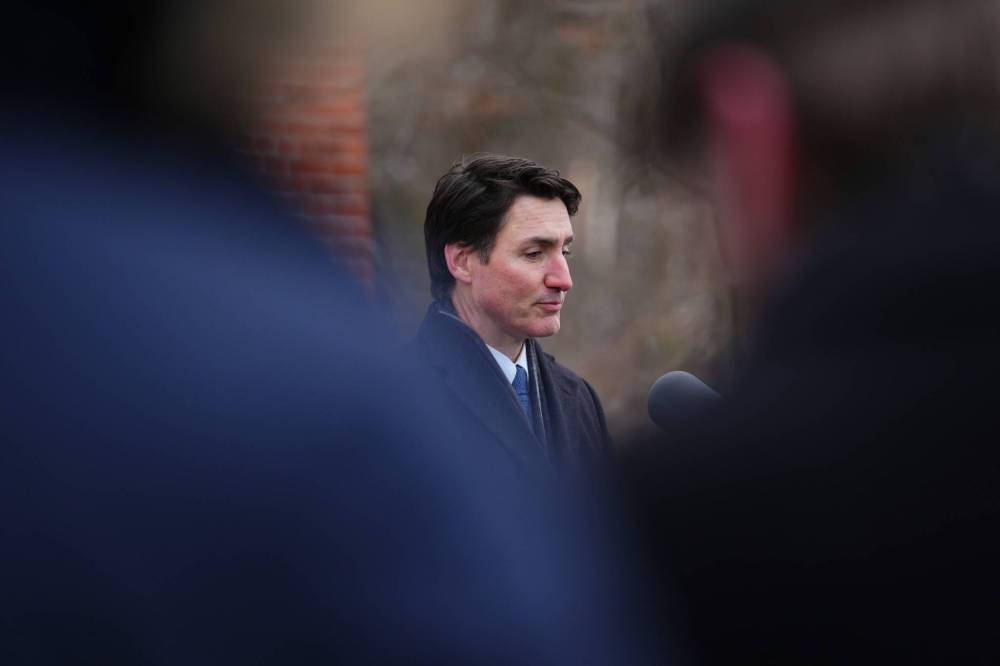The quality that likely will determine the next leader of the federal Liberal party — and the next prime minister — is the ability to handle U.S. president-elect Donald Trump.
Trump’s promised 25 per cent tariff on Canadian goods would drive inflation up, throw international supply chains into chaos and threaten hundreds of thousands of jobs, creating a trade war in which both countries would lose.
Proof the incoming U.S. president may actually impose these tariffs is the fact he did this before (on Canadian steel and aluminum in 2018) and his distracting, empty threats to “annex Canada” — a strategy Trump uses when he wants to draw attention away from populist but ultimately petty and destructive ideas.

SEAN KILPATRICK / THE CANADIAN PRESS FILES
Prime Minister Justin Trudeau announces his resignation as Liberal leader and prime minister on Jan. 6.
The increasing likelihood of the federal Liberal leadership campaign getting swept up in focusing on Trump is the real threat.
There are pressing, critical issues the next prime minister must address.
Climate change is at the top of the list. Anyone who wants to argue only needs to look at wildfires in California, B.C. and Alberta, floods in Québec and Ontario, or the fact August was the hottest on record in Canadian history.
Housing prices, the cost of groceries and the radical increase in poverty and homelessness in Canadian cities — all of which relates to increasing crime, addiction, child welfare and demands on health care — is right up there with climate change on the list.
A close third is the rancorous state of politics in the country.
In recent years, Parliament has become gridlocked, politicians are revered for their hubris and hyperbole, and voting is used to stop ideas and individuals rather than bridge them together.
Focusing on Trump — a man who denies basic tenets of climate change, worries more about invading Greenland than grocery prices and is the most divisive politician in the world — does little to deal with any of these issues.
Remembering what brought Justin Trudeau and the federal Liberals back from the political wilderness to power in 2015 is far more instructive.
Back then, Trudeau inspired a wave of optimistic progressivism, appealing to Canadian young people and the middle class, promising to bring gender parity to cabinet, and rejecting divisive ideas like blaming immigrants for national problems (remember Conservative prime minister Stephen Harper’s niqab policy?)
Trudeau promised “sunny ways” were ahead when he as first elected. “This is what a positive politics can do,” he announced.
The most influential of these ideas was engaging meaningfully in reconciliation with First Nations, Inuit, and Métis peoples.
After his first month in office, for example, Trudeau became the first prime minister to appear at the Truth and Reconciliation event and announced he would “fully” implement all of the final report’s 94 calls to action.
This led to a popularity few Canadian governments have achieved. Two-thirds of Canadians approved of Trudeau and his leadership in a September 2016 Angus Reid poll.
At the same time, more Indigenous peoples voted, ran in elections, and participated in Canadian politics than ever before.
Though Trudeau ultimately wasn’t successful in bringing many of his progressivist “sunny ways” into reality, when it comes to reconciliation, things are far more improved than they were under any Canadian prime minister in history.
A quick look at the 2021 Canadian census shows Indigenous median income is up. More Indigenous peoples are employed — due to the fact the average amount of Indigenous peoples finishing high school and university is up.
Boil water advisories are down.
Indigenous communities experiencing impacts by wildfires, floods, or COVID-19 received assistance and initiatives to address their unique situations.
Laws have been passed that hand over jurisdiction over child welfare to Indigenous governments and require Canadian law to come into harmony with Indigenous rights.
A national inquiry on murdered and missing Indigenous women and girls was completed — with Trudeau recognizing genocide against Indigenous peoples was taking place.
The website Indigenous Watchdog, which tracks the federal government’s achievements on the TRC calls to action, reports 79 of the calls to action have seen some progress. Fourteen have been “completed.”
In fact, engaging with issues involving Indigenous peoples in one way or another deals with all of the issues a prime minister now needs to address: climate change, the economy and bringing people in this country together.
I’d never be one to say Trudeau and the Liberals did enough during their decade in office, but I would say that what brought them to power wasn’t dealing in empty threats and petty ideas, inspiring chaos and division, and sowing division and anger.
It was by promising “sunny ways” with reconciliation with Indigenous peoples at the centre.
The next Liberal leader might best remember that.
niigaan.sinclair@freepress.mb.ca

Niigaan Sinclair
Columnist
Niigaan Sinclair is Anishinaabe and is a columnist at the Winnipeg Free Press.
Our newsroom depends on a growing audience of readers to power our journalism. If you are not a paid reader, please consider becoming a subscriber.
Our newsroom depends on its audience of readers to power our journalism. Thank you for your support.